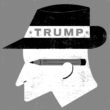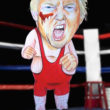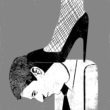One of the older conventional wisdoms in our nation’s capital is that any president who tries to plug leaks in the ship of state is engaged in a futile, self-defeating exercise. The leaker(s) can never be definitively identified, and any attempt to do so involves tactics more familiar to a police state and likely to boomerang. Richard Nixon’s formation of a secret “plumbers unit” is invariably cited as proof of this proposition, as it was arguably the first step in the self-destruction of his presidency. But Washington clichés often seem like athletic records: they exist in order to be broken.
Regardless of how it ends, the investigation into who leaked the occupation of Ambassador Wilson’s wife, Valerie Plame, to columnist Robert Novak has already shattered several conventions. When special counsel Patrick Fitzgerald took up his charge in 2003, many observers predicted that his probe would wind up like countless others mounted in the past. He might develop a list of probable sources, but ultimately Fitzgerald would prove unable to pinpoint the leaker(s)—and reporters, of course, never identify their confidential sources.
But espousers of the conventional wisdom too quickly discounted several unique aspects of the case. Fitzgerald was specifically investigating whether a felony had been committed under the Intelligence Identities Protection Act of 1982, rather than some run-of-the mill leak. Plame’s standing as a CIA officer under non-official cover was also a secret known (and only of interest to) a very small circle outside the agency, chiefly the office of Vice President Cheney. By working the investigation from the inside out, via e-mails, schedules, telephone logs and interviews, Fitzgerald was able to pinpoint what two White House aides, Karl Rove and I. Lewis “Scooter” Libby, knew and when they’d learned it. Fitzgerald then extracted waivers of confidentiality from the two men by hoisting them with their own petards: since the White House had confidently declared that neither aide was involved in outing Plame, Rove and Libby could hardly refuse.
That was the moment that Rove, Libby and their lawyers must have started to feel very queasy about Fitzgerald’s ability to achieve the previously unachievable. The waivers helped open the door for reporters to talk, some more willingly than others, about their conversations with the White House aides. The Supreme Court was not about to reverse precedent and rule that reporters have an absolute right, during a criminal investigation, to protect their sources under the First Amendment.
It seems obvious that Rove and Libby were wedded, as much as anyone, to conventional notions about how the leaking game is played in Washington. Otherwise, what happened defies explanation. The only plausible reason Libby would have given his allegedly false statements to the FBI, and committed perjury and obstruction of justice before a grand jury, was that he believed he could get away with it, i.e., he was convinced that reporters’ sworn testimony would never be pitted against his own. He also seems to have miscalculated in thinking that the main legal threat he faced was violation of the 1982 act. Fitzgerald has charged no one under that narrow law, nor is he likely to.
Judging from Fitzgerald’s five-count indictment, if Libby had simply feigned a loss of memory or told the truth, he might still be the vice president’s chief of staff and national security adviser. At this writing, the only difference between Rove and Libby seems to be that Rove and/or his lawyers were quicker to realize that this leak investigation just might be different. Rather than initially attempting to deceive and later to obstruct, Rove seemed to have a fresher memory of events with every grand jury appearance.
Libby’s indictment has already exacted a political toll on the Bush administration regardless of how this situation plays out. Even with the Iraq War raging, and even though the White House further distorted already flawed intelligence to justify that war, President Bush had managed to enjoy a positive rating with the public in terms of his personal integrity. No longer. The Libby revelation has struck a nerve with the public. Nearly six out of every ten citizens believe the administration is ethically challenged, according to an Associated Press-Ipsos poll conducted in early November.
A TWO-EDGED SHIELD—If the Plame affair were to be investigated no further, it would likely be remembered as the pivotal mistake of the Bush presidency, the moment when the administration’s arrogance and bald duplicity on national security matters finally caught up with it. But the shattering of conventions in this leak case has likely not yet run its course. If recent signals from Libby’s lawyers are to be believed, his defense team plans to pursue testimony from journalists aggressively, both those named, and those unnamed, in the indictment, and to seek access to their notes and records. Such a strategy threatens to turn any trial into a protracted legal battle over reporters’ privilege, with reporters coming out the losers.
Such a turn would be in keeping with an ominous trend, because the Libby indictment is not occurring in a legal vacuum. For nearly three decades following the Supreme Court’s decision in a 1972 case known as Branzburg v. Hayes, federal courts rarely issued subpoenas seeking the disclosure of reporters’ anonymous sources, despite the absence of a federal “shield law” protecting reporters’ historical privilege to keep the identity of their sources confidential. But in the last few years this privilege has come under concerted attack in a variety of cases. Both prosecutors and defense attorneys have been resorting, in increasing numbers, to the tactic of using reporters and/or their ostensibly privileged information to achieve victories in court that might otherwise be unobtainable.
In a pending lawsuit brought by Wen Ho Lee, for example, five journalists are facing contempt-of-court charges and $500-a-day fines because they refused to reveal their government sources for stories written or broadcast in 1999 about the former Los Alamos nuclear weapons scientist. Lee was publicly accused of espionage then—wrongly, it turned out—and he is now suing the Energy and Justice departments, and the FBI, for violating his rights under the Privacy Act. He claims that five reporters (H. Josef Hebert of the AP, Robert Drogin of the Los Angeles Times, James Risen of the New York Times, Walter Pincus of the Washington Post, and Pierre Thomas, then with CNN) received confidential information about his employment and finances from federal officials. It does seem obvious that they did. But in order to prevail in his civil suit, Lee must identify precisely which government entity provided the information, and only the reporters know that.
Short of complying with the lower court order to be questioned by Lee’s attorney, the reporters have only one recourse: an appeal to the Supreme Court. If the Lee case is accepted by the Justices, it will mark the first legal test of reporters’ privilege since 1972, the last time the Court addressed the issue. And while there is little doubt Lee is justified in seeking redress for the grave personal damage done to him, a marked erosion of reporters’ privilege would be a high price to pay for compensating him.
Meanwhile, an entirely separate legal proceeding raises a somewhat different, but still very troubling, issue. In this instance, federal prosecutors seem bent on criminalizing the dissemination of classified information to a journalist. The case involves a Washington Postreporter, Glenn Kessler, and two lobbyists, Steven Rosen and Keith Weissman, from the American Israel Public Affairs Committee (AIPAC), a pro-Israel organization.
Unbeknownst to Kessler, Rosen and Weissman were put under FBI surveillance in 2004 after Larry Franklin, a Pentagon analyst, admitted to having passed classified information on to them as well as directly to journalists on numerous occasions. Franklin had agreed to participate in a “sting” operation, whereby he would pass an allegation about an Iranian plot in Iraq to Rosen and Weissman while the FBI monitored the two lobbyists to see what they would do with the information.
On this occasion Franklin handed no actual documents to Rosen and Weissman, so when they phoned Kessler in July 2004, all they could convey was oral information, gleaned, they told him, from “an American intelligence source” whom they would not identify. Kessler never wrote a story based on the leak, but that tape-recorded conversation is now part of the federal indictment of Rosen and Weissman, who were charged in August with “conspiracy to communicate [classified information] to persons not entitled to receive it.”
This particular allegation represents a very aggressive application of the 1917 Espionage Act. Indicting either AIPAC lobbyist for knowingly passing classified information to a representative of a foreign power (which the lobbyists deny they did) is one thing, but still in keeping with traditional prosecutions under the statute. On the other hand, including “members of the media” as persons not entitled to receive that information is a startling departure. If allowed to stand, it will tend to “criminalize conversations with journalists,” as Howard Kurtz of theWashington Post put it, if not nudge application of the 1917 law uncomfortably close to a British-style Official Secrets Act.
THE BLACK SITES—Another worrisome situation concerns Dana Priest, a Washington Postreporter, who broke a November 2 story about a “hidden global internment network” run by the CIA to house suspected members of Al Qaeda. The so-called “black-sites program” dates back to six days after the 9/11 attacks, when President Bush signed a directive authorizing the CIA to kill or detain Al Qaeda members anywhere in the world. The first black site was established in Afghanistan, and by mid-2002 another two existed in Thailand and at the U.S. base in Guantánamo Bay, Cuba, alongside the prison that is known to the public. By early 2003, the agency had brokered deals with two Eastern European countries—later identified in England’s Financial Times as Romania and Poland—to establish black sites in Soviet-era compounds. “The top Al Qaeda prisoners exist in complete isolation from the outside world,” wrote Priest. “Kept in dark, sometimes underground cells, they have no recognized legal rights, and no one outside the CIA is allowed to talk with or even see them, or to otherwise verify their well-being.”
This is precisely the kind of investigative reporting Americans acutely need about the war being waged in their name. Priest’s story was drawn directly from, among others, CIA officials who are deeply concerned about the legality, morality, wisdom, and/or the sheer practicality of imprisoning even hardened terrorists indefinitely, in complete secrecy, and without the slightest bow to international law or convention. What is surely extremely troubling is that the covert program, originally designed to sequester the top Al Qaeda leaders thought to be directly responsible for 9/11, has grown like mad. The standard for consigning suspects to this “invisible universe” has been lowered or ignored, Priest wrote. “They’ve got many, many [prisoners] who don’t reach any threshold,” said one intelligence official.
Under normal circumstances, Priest’s biggest concern would surely be what to wear when she accepts a Pulitzer Prize for her work. Instead, she is contemplating the distinct possibility of a proceeding that might ultimately attempt to force disclosure of her confidential sources. CIA director Porter Goss, a former Republican congressman from Florida, has referred the leak to the Justice Department for investigation—thus putting in motion the same process that resulted in Libby’s indictment.
Meanwhile, Senate Majority Leader Bill Frist (R-TN) and House Speaker Dennis Hastert (R-IL) have ostentatiously called for a joint congressional investigation, with Frist declaring that the leak itself presents a greater threat to national security than the existence of the black sites. And the House Intelligence Committee has announced it will oblige Hastert, which might force Priest into an awkward confrontation with grandstanding politicians.
The rank partisanship that pervades Washington now threatens to spill over into arenas that have been comparatively free of bitter, tit-for-tat politics. The sooner reporters’ privilege is codified into law at the federal level, the better off everyone will be. The District of Columbia and 31 states have passed shield laws for the press. There is no reason why there should not be a federal statute so that reporters can go about their job without having to look over their shoulder to see if lawyers are coming after them.
In an above-the-fold Op-Ed in the New York Times on November 2, GOP über-lobbyist Kenneth Duberstein offered President Bush a timely history lesson on how to rescue his flagging administration. Duberstein certainly has the credentials to give such advice. In 1987, when Ronald Reagan’s public approval rating was about as low (because of the Iran-contra scandal) as Bush’s is now, Duberstein became part of the new White House team that rescued Reagan from being not just a lame duck, but a “dead duck,” for the balance of his second term.
Duberstein’s first suggestion to Bush was that he clean house and bring in experienced managers untainted by scandal, just as Reagan made former Senator Howard Baker (R-TN) his new chief of staff in 1987. “Senator Baker gave the operation an instant dose of integrity: it was he, as a Republican legislator during Watergate, who demanded, ‘what did the president know, and when did he know it?'”
In point of fact, when Howard Baker voiced his famous question in 1973, the Tennessee senator’s purpose was to insulate Richard Nixon from John Dean’s damaging Senate testimony, essentially by pitting Dean’s word against the president’s. Baker had no idea that secret tape-recordings existed; if he had, he never would have posed this central question. Far from wrapping Nixon in an impermeable legal cocoon, it brought the president down.
Baker was not just loyal to Nixon, moreover, which would have been fair enough. He played a double game on the Senate Watergate committee, cooperating with chairman Sam Ervin but also acting as the president’s agent on the panel, as historian Stanley Kutler documented in his 1990 book on Watergate. While Baker often counseled Nixon to cooperate, he also served as a “back channel” for confidential information about the panel’s investigative tactics and priorities.
But nothing illustrates Baker’s lack of scruples 30 years ago more than his desperate but futile effort (together with then-minority-counsel-turned-senator-now-actor Fred Thompson) to implicate the Central Intelligence Agency in Watergate at the eleventh hour. Barely a month before Nixon’s resignation, Baker released a study that tried to insinuate that the scandal “just reeked of [illegal] domestic operations” by the CIA.
The next time a political partisan is given prime space on the Op-Ed page, the Times may want to fact-check the history. Duberstein’s version is only suitable for the Howard Baker Center for Public Policy, a $15 million facility at the University of Tennessee that had its ground-breaking on November 16, with Vice President Cheney in attendance.
A footnote: According to the Weekly Standard, former senator Thompson is just the kind of articulate advocate the administration desperately needs to defend itself against charges that it misrepresented pre-war intelligence about Iraq.






0 Comments